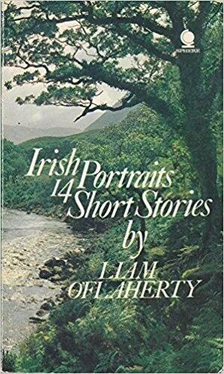He smiled strangely and said:
“I’m going into the town.”
When he returned in the evening, he handed her a document.
“That’s the will,” he said. “In case God sends for me, Charley will have every penny I own. Look after that.”
She kissed his hand and brought the will to her trunk. Putting it in, her eyes glittered and she sat for a long time before the open trunk, sucking her lips and smiling.
Patrick returned drunk that night, but he went to bed quietly. Next day, when they were working on the crag, Martin said to him:
“I didn’t see you in the town yesterday.”
Patrick looked at him and said nothing.
“I went in to make that will I was talking about,” said Martin calmly.
Patrick remained silent.
“It’s all settled now,” continued Martin quietly, “so my mind is at peace.”
“Listen,” whispered Patrick savagely.
Martin looked at him.
“Watch yourself,” whispered Patrick.
They glared at one another. Their faces were white with hatred.
“I’m satisfied,” whispered Martin through his teeth.
After that they became silent and avoided each other. Kate assumed complete charge of the house. She ordered them about.
“The horse needs water,” she would say. “One of you go and bring her to the well.”
Again she would say:
“The cow is starving in that field. Change her, one of you, to the Red Meadow.”
She never called either of them by name, but spoke to them in common, as if they were strangers. It was she who treated with neighbours about cases of trespass and she paid the rates and the rent that came due in summer.
Neither of the brothers paid any attention to her. They watched one another ceaselessly. Their eyes became fixed.
Suddenly a wild hurricane came raging over the ocean. The sun, moon and stars were hidden day and night behind a wall of black clouds that belched rain upon the earth and clashing in their flight from the shrieking gale, set the firmament on fire and shook the cliffs with the thunderous echoes of their bursting. The sea rose to the summits of the cliffs and its foam was carried on the wind far into the land. Even the wild seagulls fled into the village and stood upon the gables of the houses and screamed in horror.
For three days the storm lasted. Then the wind died. The sun appeared. The sky grew clear. The waves began to fall, heaving like wounded animals, into the sea’s back. Rafts of curdled foam and torn weeds, speckled with jetsam, floundered to the shore. People came to look for wreckage.
In the evening Patrick said to his brother:
“Be ready at dawn. We are going in the boat to look for wreckage.”
Martin answered him:
“I’m satisfied.”
They both went to bed. Neither slept. Each kept rising in the night and going to the window to see if dawn had yet broken. Kate also lay awake. A cock crew an hour before dawn. At once both brothers began to put on their clothes hurriedly. Kate also arose and threw a coat over her nightdress:
Martin was the first to get to the kitchen. He cried in a loud voice:
“Are you ready now?”
Patrick came into the kitchen, followed by Kate.
“You had better take some bread, one of you,” she said. “You’ll be hungry before you get back.”
“We won’t need bread,” said Patrick. “Get the rope, you. Where is the rope?”
“I’ll get it,” said Martin, going out to the barn,
Patrick began to fumble in the pockets of his waistcoat.
“Why have you on your new waistcoat?” she said. “You have your new cap on too.”
“Mind your business,” he said. “Give me my old waistcoat.”
She brought it to him. He took it aside and took a knife from its pocket. He put it furtively into the pocket of the waistcoat he was wearing. She saw him, but said nothing. Her eyes became fixed.
Martin came in, carrying a coil of rope on his arm.
“Are you ready now?” he said.
Without speaking Patrick moved to the door.
“Wait,” said Kate, “till I sprinkle the Holy Water on you.”
They both went out without answering her. She picked up a little cruet of Holy Water that hung on a nail in the wall by the window. She ran out into the yard after them and shook Holy water on each of them with her forefinger. Neither of them blessed himself.
Then she returned to the house, went into the child’s room and stood by his little bed, watching him and listening to his breathing.
The brothers walked in silence through the village and along the rocky road over the crags to the shore. Their boat lay bottom upwards within a fence of stones above the mound of boulders that lined the shore. They knocked down the fence at the prow and at the stern. Then they raised the prow. Martin crawled under the boat, raised it higher and rested his shoulders against the front seat. Patrick crawled in astern, put his shoulders against the third seat and straightened himself.
“Go ahead,” he said.
They moved off, carrying the boat on their shoulders. Its black, canvas-covered hulk, with their legs sticking from beneath, moving slowly over the rocks, made it look like a beetle. They brought it to the brink of the tide and stepping into the water, they laid it, mouth upwards, with a splashing sound, upon the waves. Patrick held it to the shore while Martin brought the oars and the rope. They put the oars on the thole-pins and threw the rope into the stern.
“Keep your hand on her,” said Patrick, about to step aboard.
“You hold her,” said Martin. “I’m going in the prow same as I always do.”
“No,” said Patrick in a whisper. “I’m going in the prow today.”
They looked at one another coldly. Their eyes were fixed.
“Go ahead,” said Martin. “It’s all the same to me.”
“Why so?” said Patrick through his teeth.
“Go ahead,” said Martin, “seeing you want to go in the prow.”
“It’s all the same to me too,” said Patrick softly. “I’ll go in the stern as I always do.”
“You’ll go where you said you’d go,” said Martin, “or I’ll stay on the rock.”
They glared at one another again. Then Patrick stepped into the boat, sat on the front seat and seized the oars. Martin pushed off the boat and jumped aboard. They began to row eastwards towards the cliffs.
The sea was still disturbed. Although its dark surface was unbroken, there were deep hollows between the waves that came rolling quickly to the shore. The light coracle bounded from wave to wave, bobbing like a little bird in flight against the wind.
The sun began to rise as they turned a promontory. The sea glittered. They rowed close to the cliffs that rose above them precipitously. There was a loud sound of birds coming forth to fish from their caverns. Seagulls soared about them. The sea was littered with refuse. Now and again, the fin of a shark cut the surface. Gannets swooped from on high and fell like bullets, with a thud, into the floating rafts of weeds.
Masses of weeds, shining in the sunlight, lay among the broken rocks at the base of the cliffs.
They rowed quickly, searching the sea and the shore for wreckage. They had rowed three miles when at last they saw a great beam floating near the shore in a raft of weeds.
“There’s a beam,” said Patrick. “Put a noose on the rope.”
Martin shipped his oars and made a noose with the end of the rope. He tied the other end to the central seat. They rowed towards the beam. The beam rushed back and forth, on the ebbing tide. There was a heavy swell. The great piece of timber sometimes raised its head aloft from the mass of floating weeds, like a great sea monster nosing at the air. They rowed around it, seeking a chance to encircle its snout with the noose as it rose upon a wave.
Читать дальше












